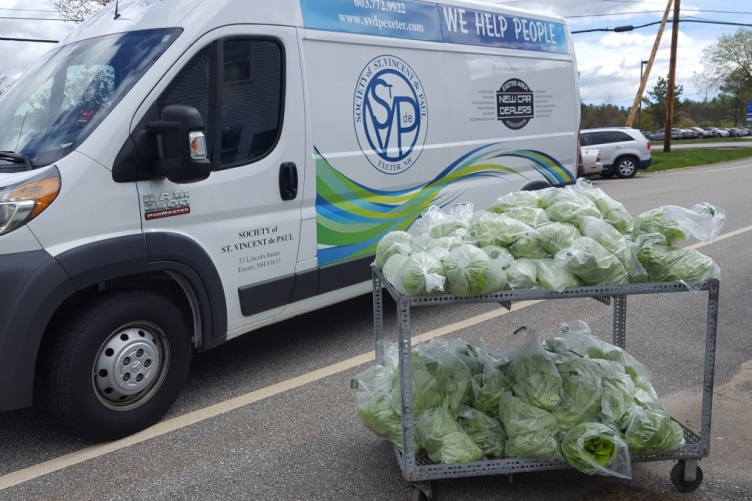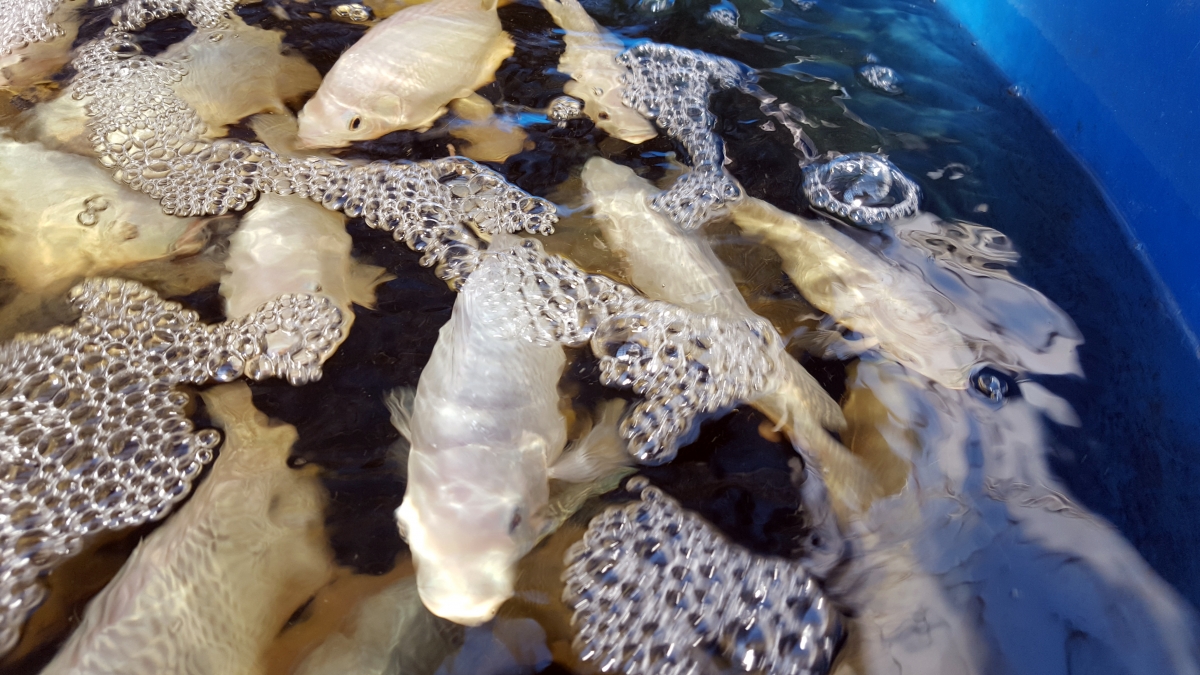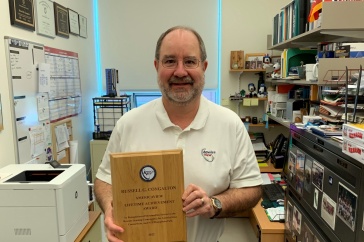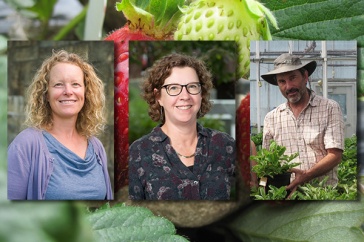
Since spring, the food pantry at the Society of St. Vincent de Paul in Exeter has received lettuce grown as part of a UNH aquaponics research project funded by the NH Agricultural Experiment Station.
New Hampshire residents who rely on the state’s food pantries have been enjoying fresh food donated by the NH Agricultural Experiment Station at the University of New Hampshire, including tilapia and lettuce produced in sophisticated aquaponics systems and squash and other vegetables grown at university farms.
 “A central component of our mission is to assist New Hampshire’s farmers and growers by conducting research that helps them make better decisions about what to grow for market. This, in turn, directly benefits the state’s agricultural economy. Donating the fresh food outputs from our research to our state’s food pantries allows us to not only provide nutritious vegetables and fish to those in need, but to not compete with our producers,” said Jon Wraith, director of the NH Agricultural Experiment Station and dean of the UNH College of Life Sciences and Agriculture.
“A central component of our mission is to assist New Hampshire’s farmers and growers by conducting research that helps them make better decisions about what to grow for market. This, in turn, directly benefits the state’s agricultural economy. Donating the fresh food outputs from our research to our state’s food pantries allows us to not only provide nutritious vegetables and fish to those in need, but to not compete with our producers,” said Jon Wraith, director of the NH Agricultural Experiment Station and dean of the UNH College of Life Sciences and Agriculture.
The experiment station works with a select group of organizations regarding food donations, including the Cornucopia Food Pantry at the Waysmeet Center in Durham, St. Vincent de Paul Food Pantry in Exeter, and the NH Food Bank. Some targeted food also goes to UNH’s dining halls via UNH Dining Services and the Dairy Bar restaurant.
So far this year, UNH has donated almost 5,000 heads of lettuce and 1,100 pounds of fish grown in aquaponics systems at the Macfarlane Research Greenhouses and the Anadromous Fish and Invertebrate Research Lab. Fish carcasses were donated to lobster fishermen in Portsmouth and/or composted at the Kingman Research Farm. Donations also included 44 boxes of tomatoes and 28 boxes of peppers grown at the Woodman Horticultural Research Farm and 400 pounds of squash grown at the Kingman Research Farm. All of the food was grown as part of experiment station-funded research, much of which aims to develop nutritious, good-tasting food varieties that are ideal for the state’s growing conditions.
Going forward, UNH expects to produce 750 heads of lettuce per week from three new recirculating farm greenhouses at the Kingman Research Farm, which also will initially produce 500 to 600 pounds of fish per year. Researchers will scale up production, with the goal to develop best practices to maximize plant and fish production.
Larry Brickner-Wood is chaplain and executive director at The United Campus Ministry to UNH, which operates the Cornucopia Food Pantry at the Waysmeet Center. The pantry serves the Durham and UNH communities.
“Waysmeet and our Cornucopia Food Pantry work hard and strategically to get as much fresh food as possible for our community and patrons. We do this in part through our food rescue and recovery program, and our working partnerships with local farms and gardens. For the past several years we have been fortunate to receive fresh fruits and vegetables from the UNH Woodman and Kingman Farms. COLSA dean Dr. Jon Wraith has been instrumental in formalizing this partnership over the past year, and we have been gifted with hundreds of pounds of fruits and vegetables, including tomatoes, peppers, apples, squash and sweet potatoes,” Brickner-Wood said.
 “Our patrons love all of the fresh food we bring in, and the great veggies and fruit from the farms is usually all gone in 24 to 48 hours. This partnership is so helpful to us and our commitment to getting good food to people. We and our customers are extremely grateful!” he said.
“Our patrons love all of the fresh food we bring in, and the great veggies and fruit from the farms is usually all gone in 24 to 48 hours. This partnership is so helpful to us and our commitment to getting good food to people. We and our customers are extremely grateful!” he said.
Since spring, the food pantry at the Society of St Vincent de Paul in Exeter has received lettuce grown as part of an aquaponics research project. The pantry, which typically receives about 75 heads of lettuce weekly, helps approximately 240 low-income households each month from Exeter, East Kingston, Kensington, Newfields, Brentwood, and Stratham.
“The generous lettuce donations provided by your research program have been an immense help by providing our clients fresh produce,” said Molly Zirillo, executive director, Society of St Vincent de Paul Exeter.
This material is based upon work supported by the NH Agricultural Experiment Station, through joint funding of the National Institute of Food and Agriculture, U.S. Department of Agriculture, and the state of New Hampshire.
Founded in 1887, the NH Agricultural Experiment Station at the UNH College of Life Sciences and Agriculture is UNH’s original research center and an elemental component of New Hampshire's land-grant university heritage and mission. We steward federal and state funding, including support from the USDA National Institute of Food and Agriculture, to provide unbiased and objective research concerning diverse aspects of sustainable agriculture and foods, aquaculture, forest management, and related wildlife, natural resources and rural community topics. We maintain the Woodman and Kingman agronomy and horticultural research farms, the Macfarlane Research Greenhouses, the Fairchild Dairy Teaching and Research Center, and the Organic Dairy Research Farm. Additional properties also provide forage, forests and woodlands in direct support to research, teaching, and outreach.
-
Written By:
Lori Tyler Gula, PhD | NH Agricultural Experiment Station | lori.gula@unh.edu | 603-862-1452



















































